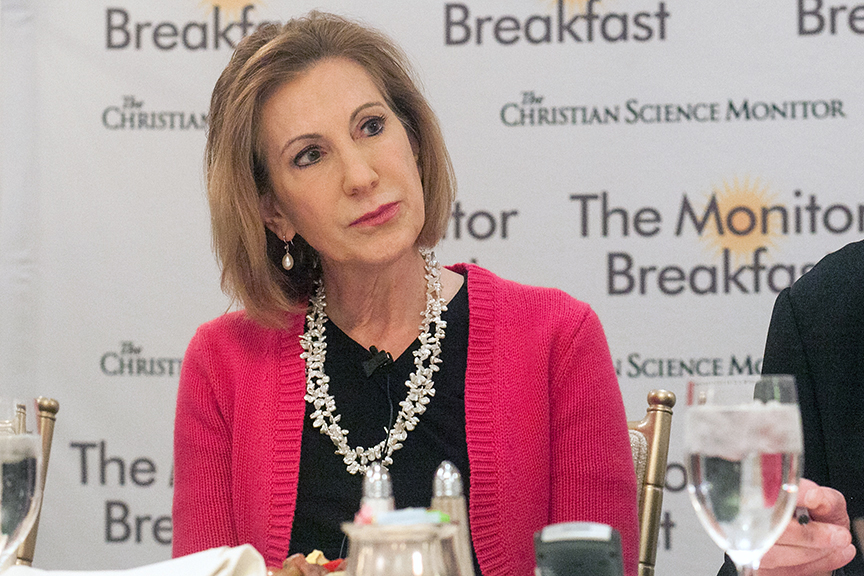
Carly Fiorina laid out the new Republican strategy for talking about abortion at an event in Washington Thursday.
Speaking at a breakfast hosted by the Christian Science Monitor, the former Hewlett-Packard CEO and likely Republican presidential candidate explained how she discusses the issue with female voters, many of whom she said are initially “uncomfortable” with the GOP’s pro-life stance.
Her answer, she says, is always to ask them whether or not they’ve read the Democratic platform on the issue.
“I remind them that it says any abortion, any time, at any point in a woman’s pregnancy for any reason to be paid for by taxpayers and now, some would like to add, to be performed by a non-doctor,” Fiorina said. “A policy succinctly summarized by (Sen.) Barbara Boxer as, ‘It’s not a life until it leaves the hospital.’ How do you feel about this? Women are horrified by that.”
The 2012 Democratic national platform says that it “strongly and unequivocally supports Roe v. Wade and a woman’s right to make decisions regarding her pregnancy, including a safe and legal abortion, regardless of ability to pay.” The Boxer quote, often cited by pro-life activists, comes from a 1999 colloquy on the Senate floor which the California Democrat has said is taken out of context.
Fiorina’s roadmap on the issue tracks other Republican comments. Kentucky Sen. Rand Paul, who recently launched his campaign for the GOP nomination, took a similar tack when answering a question about abortion on the campaign trail.
“You go back and go ask (Democratic National Committee head) Debbie Wasserman Schultz if she’s OK with killing a 7-pound baby that’s just not born yet,” he told a reporter with the Associated Press. “Ask her when life begins, and ask Debbie when she’s willing to protect life. When you get an answer from Debbie, come back to me.”
Fiorina said that bringing the Democrats into discussions about abortion is a crucial way to make people who may have been skeptical more receptive to the Republican message.
“I don’t expect everyone to agree with my position on everything,” she said. “But I do think when you start to have a conversation in that way and lay out things that maybe people haven’t thought of before, then it is easier to find common ground.”
More Must-Reads from TIME
- Donald Trump Is TIME's 2024 Person of the Year
- Why We Chose Trump as Person of the Year
- Is Intermittent Fasting Good or Bad for You?
- The 100 Must-Read Books of 2024
- The 20 Best Christmas TV Episodes
- Column: If Optimism Feels Ridiculous Now, Try Hope
- The Future of Climate Action Is Trade Policy
- Merle Bombardieri Is Helping People Make the Baby Decision
Write to Tessa Berenson Rogers at tessa.Rogers@time.com